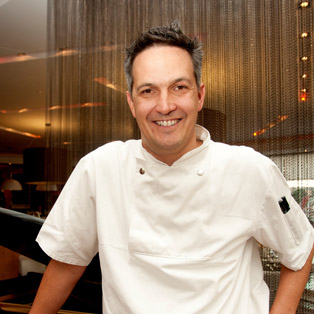News
Uptown boy
Wednesday, September 7th, 2011
“06h45 to 07h45 – that’s the most important hour of the day,” David Higgs tells me.
Now it’s three in the afternoon, that strange twilight zone between late lunch and early dinner, and David is eight hours into a 16-hour shift. It’s been two months since he started as executive head chef at Central One Bar and Restaurant at the Radisson Blu in Sandton. He’s visibly tired, and his phone keeps ringing. “I think Joburg is the thing I’ve been missing all these years,” he says with a grin. “I love the pace.”
David claims to be a bit of an adventurer. He likes long road trips to Namibia (he lived in Walvis Bay until he was ten) and Botswana, preferably on his newly resprayed KTM, and – after 30 years in Cape Town – he’s slowly testing out his new habitat in the Highveld.
“I try to take Sundays off, or a few hours on a Saturday. I love getting into my car and nipping out to markets or to 44 Stanley.” The other day he got lost on Main Reef Road.
“My stewards have promised to take me into Soweto,” he smiles. “I’ve got this big black bakkie that they’ve adopted as an Orlando Pirates vehicle, so we’re going to go to a game.”
David’s move came as a surprise to many: trading vineyards and an award-winning restaurant for office blocks and a city not exactly known for its fine dining. But his single-mindedness is proving to be a natural fit for Joburg’s frenzied entropy, leaving little doubt that, with the right amount of effort and energy, his food will be brilliant. Because that’s just what David does.
“If you look at my career over the last 12 years, I’ve done things in cycles,” he says. “I had my own businesses (the David Higgs School of Good Cooking, and a catering business), Leinster Hall, Meerendal, Rust en Vrede… I like getting out of my comfort zone, doing a 180. That’s when you learn.”
David’s already adept at speaking the language of Joburg, which is, of course, business rather than gastronomy. “The most important thing for any chef is cost control. Wastage is a huge problem, especially in a big kitchen. The only way to manage it is by talking to the staff all the time, checking the bins. It’s part of being a chef.”
His other ‘big headache’ is orders, hence the 06h45 call time. “The challenge is not to over order or under order, to rotate stock. Stock control is critical; thereafter, it’s the quality of the food,” he says, adding that the quality of the product in Johannesburg is superb. “I can get everything I had in Cape Town, sometimes more.” Switching from a 50-seater operating five nights a week to a 100-seater for seven nights a week (complete with banqueting, a bar, and 24-hour room service) has, David admits, been daunting. “But it’s no excuse to serve ‘hotel food’.”
Rather than focus on sleight-of-hand cooking tricks or trends, David’s approach has been to prioritise the basics like mise en place. “If you’re not prepared for service, there will be trouble,” he cautions.
“It’s never about fine dining; things that explode on a plate. It’s about doing something well. The principle is always the same: flavour first, and it must be cooked properly and taste right. Whatever you’re going to do – even if you’re going to do a burger joint – just do it properly.”
To achieve this, one of the first things David tackled on his arrival at the Radisson was to challenge the mindset of the staff. “They’d done the same menu every day for a year. Now we’re making changes every week.” He also reshuffled the layout of the kitchen. “It’s really important how everything is properly positioned, so there’s no crossover,” he says. “You need a station where there’s as little movement as possible.”
David says his staff are not all skilled, but they’re all willing. “They’re awesome,” he declares proudly. A small percentage of the staff at the hotel has gone to some form of cooking school; the others are undergoing in-house training through the Radisson.
“Training is very much a part of me. It’s about mentorship,” David says. “Leading by example. I like to be there, to be hands on. I hate taking off at night.”
He also likes cooking when things are busy, and prefers to stay out of the kitchen (or peel carrots in the background) when it’s quiet. “I can’t cook when there’s no pressure, and I don’t like planning way in advance. If we put a new dish on next week Wednesday, we’ll finalise it on Tuesday. It’s got to be spontaneous; it’s all about gut feel.”
That’s the Joburg spirit.
Takeaway
David recently came back from Italy with this simple, brilliant idea for serving some of the Mediterranean dishes he loves: take small Consol glass jars with pop-off lids and layer polenta or risotto inside with oxtail or stew. Top with gremolata, re-seal and serve when ready. The jars keep the portions hot – they’re perfect for conferences and banqueting – and make quirky serving containers. It works equally well with soups.
By Nechama Brodie








